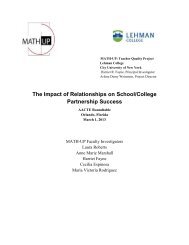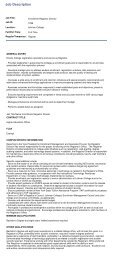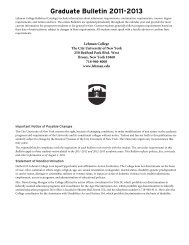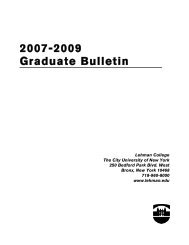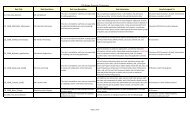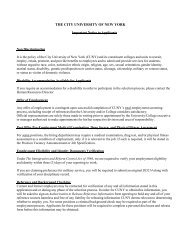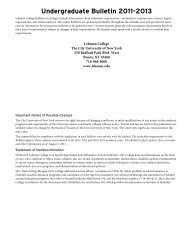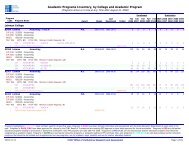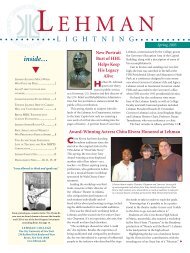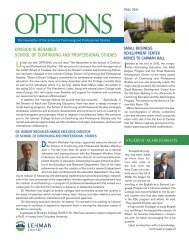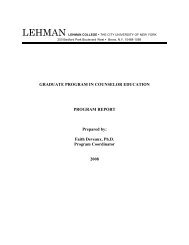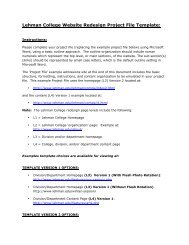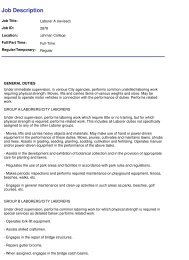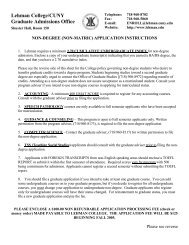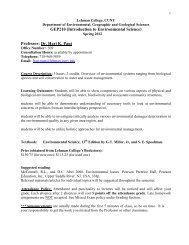Lehman Center Turns Thirty - Lehman College
Lehman Center Turns Thirty - Lehman College
Lehman Center Turns Thirty - Lehman College
You also want an ePaper? Increase the reach of your titles
YUMPU automatically turns print PDFs into web optimized ePapers that Google loves.
A few raindrops here and there could not deter the spirit of the <strong>Lehman</strong> Class of 2010 during Commencement<br />
ceremonies last spring. More than 2,700 undergraduate and graduate students were represented in the<br />
class, which heard Dr. Elena V. Ríos, president and CEO of the National Hispanic Medical Association, give<br />
the main address.<br />
Speaking for the students was Giselle Rodríguez, a native of the Dominican Republic who graduated with<br />
a B.A. in mass communication. She works full-time as an executive assistant and plans to pursue both a<br />
master’s degree and eventually a doctorate, with the goal of becoming an English professor.<br />
Receiving honorary degrees were Dr. Ríos, Mark Pigott, chairman and CEO of PACCAR Inc, and Nina<br />
Sundell, founding director of the <strong>Lehman</strong> <strong>College</strong> Art Gallery. Richard Rakowski (B.A., ‘73), a successful<br />
entrepreneur in healthcare and other fi elds, received the Alumni Achievement Award.<br />
Numerous students earned awards and recognition in the days leading up to Commencement, as well as<br />
during the event itself. Here are fi ve examples of their achievement.<br />
Daniel Aronoff: Undeterred by Disability<br />
Daniel Aronoff has never let his blindness stop him from achieving<br />
his goals. When he wanted to become a small business owner, he<br />
quit school and trained as a manager. After running<br />
his own business for a year, he realized he<br />
wanted something more.<br />
“I decided to go back to school to get a degree<br />
in a fi eld where I could help others,” says the<br />
social work major. “I discovered that my best<br />
option was social work, and I have been pursuing<br />
this new career ever since.”<br />
Despite the obvious challenges—Aronoff had<br />
to learn to navigate his way around campus—<br />
he made the most of his time at <strong>Lehman</strong>. “I<br />
enjoyed participating in <strong>Lehman</strong>’s clubs and have been a part part of<br />
events that emphasize not only socialization but that also focus on<br />
community service and charity,” he says.<br />
Aronoff began an advanced one-year Master’s of Social Work<br />
program at <strong>Lehman</strong> over the summer session. He plans to work in<br />
the fi eld and help people with disabilities.<br />
Letricia Brown: Discovering Her<br />
Leadership Talents<br />
Commencement 2010: A Grand Day for Celebrating<br />
Letricia Brown, who describes herself as “timid” when fi rst enrolling<br />
at <strong>Lehman</strong>, graduated as a confi dent campus leader and accomplished<br />
scholar who’s now enrolled in New York University’s graduate<br />
program in occupational therapy.<br />
The psychology major found her academic focus during freshman<br />
year on a trip to Tijuana with <strong>Lehman</strong> LIFE (Leaders Involved for<br />
Everyone). There, she saw “a world greater than my own and the<br />
needs of those who continue to be ignored,” as well as “the fact<br />
that people like me can make a difference in the lives of others if<br />
we choose to.”<br />
4 <strong>Lehman</strong> Today/Fall 2010 – Winter 2011<br />
Her interest in the helping professions led to<br />
the Urban Male Leadership Program, where<br />
she spoke with high school students about the<br />
importance of higher education, and with Student<br />
Disability Services, where she worked as a<br />
peer educator and as a mentor to students with<br />
autism. As co-vice president of the <strong>Lehman</strong><br />
chapter of Psi Chi, the national honor society<br />
for psychology, she led campus workshops and community service<br />
projects. She also traveled with <strong>Lehman</strong> LIFE to New Orleans<br />
to help in the rebuilding effort after Hurricane Katrina and to<br />
Cincinnati to help that city’s homeless population.<br />
Brown’s burgeoning confi dence and leadership abilities were<br />
tested when her mother fell ill and needed to be hospitalized for<br />
several months. “When she was released from the hospital, I had<br />
new demands placed on me,” she says. “I had to fi gure out how to<br />
juggle helping my mother readjust to life, given her current state of<br />
health, as well as working, church, campus life, and my schoolwork.”<br />
Brown was able not only to manage but also to excel under this<br />
pressure. She was chosen for the competitive Occupational Therapy<br />
Research Internship at Washington University in St. Louis, which<br />
she completed in 2009. As an occupational therapist, she hopes to<br />
help people with disabilities discover how to become more productive<br />
and independent.<br />
Emanuel Hickson’s Advice: ‘All you have<br />
to do is take the fi rst step and the rest<br />
will follow’<br />
Emanuel Hickson is no stranger to adversity. Born with a genetic<br />
condition that rendered him legally blind and required heart surgery,<br />
he thought of higher education as a daunting course. But with<br />
courage and perseverance, he not only earned a bachelor’s<br />
degree but also saved the homes of thousands of people as a<br />
tenant advocate.<br />
“I always say that being disabled is a club that anyone can join<br />
at any time,” says Hickson, a sociology major who was born in<br />
England to Montserratian parents and raised in the Bronx. He<br />
hopes his achievements demonstrate to his fellow students that “if<br />
anything should happen to you, you can still pursue your dreams.”<br />
Hickson did not always think that way. He dropped out of high<br />
school and went to work at New York Hospital as a dietetic aide,<br />
preparing menus for people with special diets. He stayed there<br />
until his retirement in 1992, but was never truly fulfi lled. “I didn’t<br />
have a means to express myself,” he says. “I used to pass Hunter<br />
<strong>College</strong> every day, and it was a constant reminder that I wanted to<br />
go back to school.”<br />
While recovering in the hospital from one of his numerous eye<br />
surgeries, Hickson met a social worker who suggested he visit<br />
the Lighthouse, an organization providing vocational training for<br />
the visually impaired. There, he obtained his GED and college<br />
preparation training. Afterward, he earned an associate’s degree<br />
in business administration from BMCC and wanted to continue<br />
his education.<br />
Friends had told Hickson that <strong>Lehman</strong> was a great school, with<br />
nice open spaces. When he visited the campus, he immediately felt<br />
at home. “I came here, and I liked the atmosphere,” says Hickson.<br />
“You never really know what to expect when you go back to school<br />
after all those years.”<br />
Hickson’s involvement with the tenant advocacy<br />
group Tenants and Neighbors came along quite unexpectedly.<br />
“I lived in a subsidized housing complex,<br />
and the owner walked away from the building,” he<br />
explains. Through the advocacy group, he worked to<br />
ensure that the building was preserved as affordable<br />
housing.<br />
Hickson, who is now vice president of Tenants and<br />
Neighbors, went on to assist with the acquisition of<br />
four affordable housing buildings in the South Bronx<br />
that were facing foreclosure. “I didn’t know that this was going to<br />
be the beginning of something new for me,” he says. Hickson was<br />
one of ten tenant leaders across the nation invited to Washington<br />
in 2010 by the U.S. Secretary of Housing and Urban Development<br />
to provide input on pending legislation regarding Section 8 and<br />
low-income housing.<br />
Hickson currently lives with his three grandchildren, whom he has<br />
cared for since birth, as well as his ninety-one-year-old mother. “It<br />
really bothers me when people have a dream, and they don’t think<br />
it’s possible, and they just let years drift by and don’t act on it,” says<br />
Hickson. “All you have to do is take the fi rst step and the rest will<br />
follow. I did, and it worked for me.”<br />
John Molina: Giving Back to the Community<br />
John Molina knows all too well the impact that health disparities<br />
have on poor urban neighborhoods. At <strong>Lehman</strong>, the health services<br />
administration major found the tools that will help him contribute to<br />
tackling that issue.<br />
“I attended elementary school in a community<br />
where asthma rates are among<br />
the top twenty nationwide,” says the Bronx<br />
resident. “I remember being terrifi ed as<br />
I witnessed a classmate fi ghting for her<br />
next breath while we helplessly waited for<br />
an ambulance. <strong>Thirty</strong> years later, the look<br />
in her eyes still haunts me, as does the<br />
fact that this scenario is still a common<br />
occurrence.”<br />
Molina returned to school after more than twenty years, entering<br />
through <strong>Lehman</strong>’s Adult Degree Program. After taking a course<br />
with Health Sciences Professor Jane Levitt, he discovered his<br />
true calling.<br />
“I am passionate about making a positive impact on the overall<br />
health care outcomes for the vulnerable populations that languish<br />
in underserved communities,” says Molina, who has two members<br />
of his family battling life-threatening diseases.<br />
In Fall 2010, he enrolled in the graduate program in healthcare<br />
administration at New York University’s Wagner School. “<strong>Lehman</strong><br />
has been instrumental in aiding me to fulfi ll my potential and has<br />
prepared me to achieve my dreams,” he says.<br />
Evauna Neville: A Student-Athlete<br />
With Big Dreams<br />
When Evauna Neville was deciding where to go to<br />
college, <strong>Lehman</strong> was high on her list. For starters, it<br />
was close to her Yonkers home, affordable, and, more<br />
importantly to Neville, accepted the fi fteen International<br />
Baccalaureate credits she had accumulated<br />
in high school. That allowed her to take courses in a<br />
number of different areas before deciding on a major.<br />
Neville ultimately decided on a major in African and African American<br />
Studies. “I was interested in learning more about my culture<br />
and history,” she says. “I became especially interested because of<br />
the way I was raised. My parents provided a great foundation for<br />
me, and as a whole, not a lot of black families get to experience<br />
what I did.”<br />
Neville found that getting involved made her collegiate experience<br />
even richer. Not only was she the captain of the women’s tennis<br />
team for four years, she volunteered as a peer educator and<br />
worked with both the Urban Male Leadership and LIFE (Leaders<br />
Involved for Everyone) programs.<br />
In Fall 2010, she enrolled in Teachers <strong>College</strong> at Columbia University<br />
to pursue her master’s degree in education, with a concentration<br />
in teaching young students with disabilities and special needs.<br />
In the not-so-distant future, she wants to pursue her Ph.D. in hopes<br />
of becoming a professor of African American Studies. <br />
<strong>Lehman</strong> Today/Fall 2010 – Winter 2011 5



